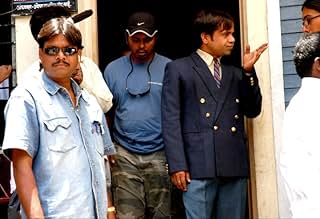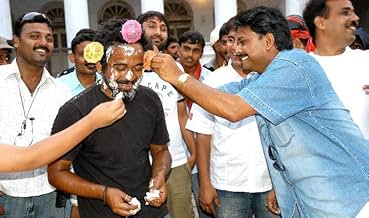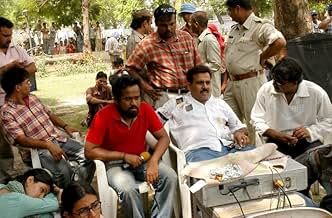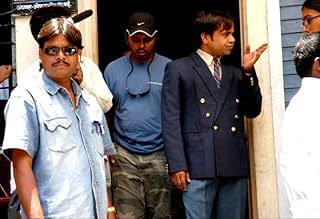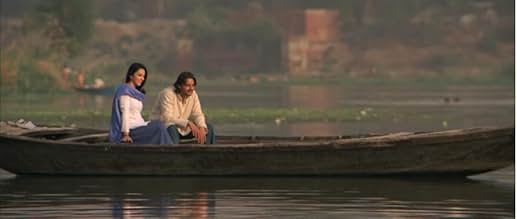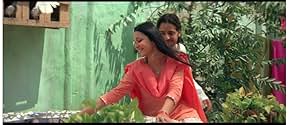Anwar
- 2007
- 2 Std. 24 Min.
IMDb-BEWERTUNG
6,5/10
1211
IHRE BEWERTUNG
Füge eine Handlung in deiner Sprache hinzuAnwar, a middle-class Muslim, falls in love with Mehru, his next-door neighbour. Post her death, he is caught by the police, and a misunderstanding leads them to believe that he is a terrori... Alles lesenAnwar, a middle-class Muslim, falls in love with Mehru, his next-door neighbour. Post her death, he is caught by the police, and a misunderstanding leads them to believe that he is a terrorist.Anwar, a middle-class Muslim, falls in love with Mehru, his next-door neighbour. Post her death, he is caught by the police, and a misunderstanding leads them to believe that he is a terrorist.
- Regie
- Drehbuch
- Hauptbesetzung
Rajpal Naurang Yadav
- Gopinath
- (as Rajpal Yadav)
Surya Dwivedi
- Villain
- (Nur genannt)
Empfohlene Bewertungen
There is only one word in this world that can aptly describe this movie, "Beautiful". It blends contemporary social issues with an artistic flavor that is rarely seen in Indian cinema. The cinematography is amazing. The film tries to explain the metaphor of love. Love in various forms, which ranges from platonic love to lust. The social issues dealt here however lack maturity but when dealing with metamorphical things, that's where the film comes into its own. Just watch the scenes where Anwar symbolizes Mehru with Meera and himself with Krishna, beautiful, just beautiful. Acting is quite fine by everyone, especially Pankaj Jha who played the minister's right hand. However the real scene stealer is VIJAY RAZ who makes you to sit and look in awe as he performs like anything. Even regular theatre actors would find it hard to swallow when the guy comes into his own. The last scene where he shouts from the rooftop, "Bhikhari nahi hoon main, kalakaar hoon kalakaar", is fantastic. This film should be shown to all wannabe directors. Over all a must watch for every Cinema lover.
The movie starts with a lot of promise, but it fails to live up to the start. The excellent cinematography is spoiled by some loose performances and poor storyline. It seems that a 'short story' has been elongated too far. The movie still manages to remain with the viewer, even after a long time of watching it. The scenes in slow motion of the peacock feather, the blood in water, the blue earrings, the chase by Krishna are exquisite and haunting. The background music and the songs are also quite nice. What troubles the most is the poor performance of actors like Rajpal Yadav and Pankaj Jha not actually making an impact. Manisha Koirala too does a dumb Barkha Dutt parody. Manish Jha leaves a lot to be desired but also brings the hope of a different powerful 'statement oriented' cinema. I really wish if he could look at the other side of India and Indians for his next movie. (Reviewed on 14 February 2007)
This movie has some beautiful music and cinematography, but the story is a total mess, there are way too many extra characters and their own story lines, it switches focus several times to characters and story lines that are barely even relevant. We don't really get to understand any of the characters as actual people; the main character Anwar is hard to understand (because he's not a fully realized character), and near the end of the movie acts in a way that isn't compatible with his previous actions. There are a lot of annoying men of various ages who cry and complain about the stereotypically cold and beautiful women who reject them. In the middle there is an "item song" that couldn't be more out of place in a movie that attempts to be angsty and heartbroken. If you're like me, you saw the songs and are intrigued, please don't watch it. The best parts of the movie are already in the songs, the rest is just a huge mess.
This isn't your typical Indian film when a girl and a boy fall in love through a series of songs, and the parents forbid it until during a teary dramatic speech they accept the fact they belong together, no. This story ventures out of the lives of certain people, of what would really happen not only the imagination of the producers or directors. I, myself am not a Bollywood fan because of its excess of love films, but this film was different, I'm sure anyone would love it. It makes you cry, smile, laugh, and surprised about the outcomes. Some of the actresses and actors who lost their popularity in the film businesses are sure to regain it after lots view this film. The music matched perfectly with this movie, it's melody was sweet and beautiful. I recommend everyone to see this!
The movie starts brilliantly, with excellent visuals giving us glimpses of colourful photographic images. Then after the opening credits, we see a young Anwar (Siddharth Koirala) travelling buy bus. He decides to stop at Dholpur and spends the night in a temple. In the morning he is awakened by voices. A minister makes an announcement about a terrorist hiding in the temple. Gradually villagers, journalists, police and even filmmakers get involved in the gathering crowd.
Jha doesn't tell his story chronologically and that works because it keeps the viewer engaged and to keep focus on different characters and their stories. 'Anwar' is mainly Anwar's story but we also see several more broken or breaking love stories e.g. the minister and his ex-mistress, master Pasha, the reporter Anita, the cop and his dying wife and of course Anwar and Mehru. Don't people do some of the most irrational things when they have just experienced a severe heartbreak? Either they want to get back at the person who destroyed the relationship (Anwar), win back the lover (Anwar), project their anger towards something (or someone) else (the minister), preoccupy themselves with something else to not think about it (Manisha's character), or take drastic measures to end the pain immediately (Vijay Raaz's character).
At the same time we also see how many of these people are getting involved with the crowd around the temple, each one there for their own benefit e.g. the paranoid journalist (Rajpal Yadav) who thinks Bin Ladin is in there or the minister who sees this as a chance to win more votes. At first I thought that the Rajpal Yadav character was ridiculous but after re-watching the film, it made a lot more sense. During such (potential) crisis situations, isn't everyone wondering who's behind it? I mean nowadays when one hears of a bomb blast anywhere, the first name that comes to mind of the common people is Al Qaeda. Yadav's paranoid character actually believes that Bin Laden's hiding in the temple and this story will make him big.
The item number may seem pointless. However, the whole shooting in the temple location makes a lot of sense. It's good publicity for the filmmaker to shoot his film at the place and time of crisis. The item number presents the ridicule of the idea.
Jha's direction is superb and throughout the film we see images that symbolize something. Jha is telling us something through each of these images. I'll come back to this later on. The performances are equally excellent. Siddharth Koirala delivers one of the finest performances of the year. Nauheed Cyrusi is brilliant and Hiten Tejwani is good too. Vijay Raaz is a knockout. The rest of the cast are all adequate. The songs and background scores flow beautifully with the screenplay.
As I mentioned earlier, 'Anwar' is full of symbols. For example: Why were all the love stories broken/incomplete? What was Jha trying to convey about love in today's world? Did Anwar see his love for Mehru as Krishna's love for Radha? In one of the earlier images we see a blue earring fall into water, in a later scene we see Udit take off that earring from Mehru's ear. It was Anwar who had bought that ring for her. Why was that boy wearing a tri-colour shirt of the Indian flag? There are several ways to interpret.
This is one of the movies I'd love to further analyze and discuss but I'll just stop here for now. I do recommend people to watch this beautiful thought-provoking work of art even though I don't think it will appeal to everyone. If it doesn't appeal on first glance, try and give it another chance. It does get better with subsequent viewing.
Jha doesn't tell his story chronologically and that works because it keeps the viewer engaged and to keep focus on different characters and their stories. 'Anwar' is mainly Anwar's story but we also see several more broken or breaking love stories e.g. the minister and his ex-mistress, master Pasha, the reporter Anita, the cop and his dying wife and of course Anwar and Mehru. Don't people do some of the most irrational things when they have just experienced a severe heartbreak? Either they want to get back at the person who destroyed the relationship (Anwar), win back the lover (Anwar), project their anger towards something (or someone) else (the minister), preoccupy themselves with something else to not think about it (Manisha's character), or take drastic measures to end the pain immediately (Vijay Raaz's character).
At the same time we also see how many of these people are getting involved with the crowd around the temple, each one there for their own benefit e.g. the paranoid journalist (Rajpal Yadav) who thinks Bin Ladin is in there or the minister who sees this as a chance to win more votes. At first I thought that the Rajpal Yadav character was ridiculous but after re-watching the film, it made a lot more sense. During such (potential) crisis situations, isn't everyone wondering who's behind it? I mean nowadays when one hears of a bomb blast anywhere, the first name that comes to mind of the common people is Al Qaeda. Yadav's paranoid character actually believes that Bin Laden's hiding in the temple and this story will make him big.
The item number may seem pointless. However, the whole shooting in the temple location makes a lot of sense. It's good publicity for the filmmaker to shoot his film at the place and time of crisis. The item number presents the ridicule of the idea.
Jha's direction is superb and throughout the film we see images that symbolize something. Jha is telling us something through each of these images. I'll come back to this later on. The performances are equally excellent. Siddharth Koirala delivers one of the finest performances of the year. Nauheed Cyrusi is brilliant and Hiten Tejwani is good too. Vijay Raaz is a knockout. The rest of the cast are all adequate. The songs and background scores flow beautifully with the screenplay.
As I mentioned earlier, 'Anwar' is full of symbols. For example: Why were all the love stories broken/incomplete? What was Jha trying to convey about love in today's world? Did Anwar see his love for Mehru as Krishna's love for Radha? In one of the earlier images we see a blue earring fall into water, in a later scene we see Udit take off that earring from Mehru's ear. It was Anwar who had bought that ring for her. Why was that boy wearing a tri-colour shirt of the Indian flag? There are several ways to interpret.
This is one of the movies I'd love to further analyze and discuss but I'll just stop here for now. I do recommend people to watch this beautiful thought-provoking work of art even though I don't think it will appeal to everyone. If it doesn't appeal on first glance, try and give it another chance. It does get better with subsequent viewing.
Wusstest du schon
- WissenswertesRelaunch of Manisha Koirala's brother, Siddharth Koirala.
- SoundtracksMaula Mere Maula
Written by Sayeed Qadri
Composed by Mithun Sharma
Performed by Roop Kumar Rathod
Courtesy of Saregama HMV
Top-Auswahl
Melde dich zum Bewerten an und greife auf die Watchlist für personalisierte Empfehlungen zu.
- How long is Anwar?Powered by Alexa
Details
Box Office
- Weltweiter Bruttoertrag
- 53.256 $
- Laufzeit
- 2 Std. 24 Min.(144 min)
- Farbe
Zu dieser Seite beitragen
Bearbeitung vorschlagen oder fehlenden Inhalt hinzufügen

